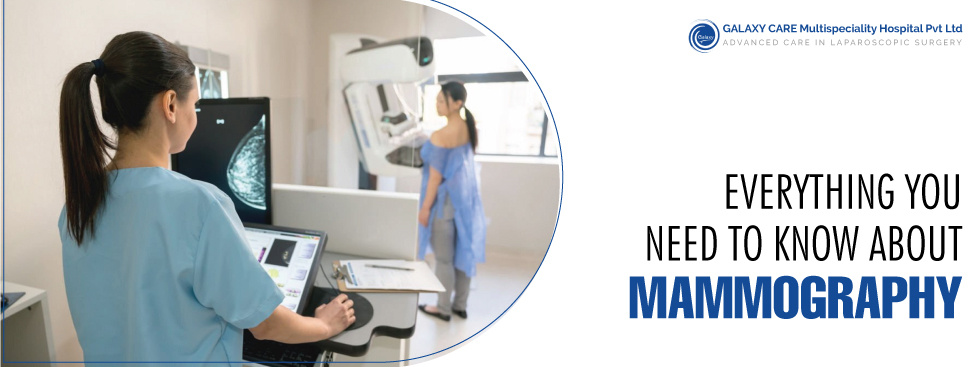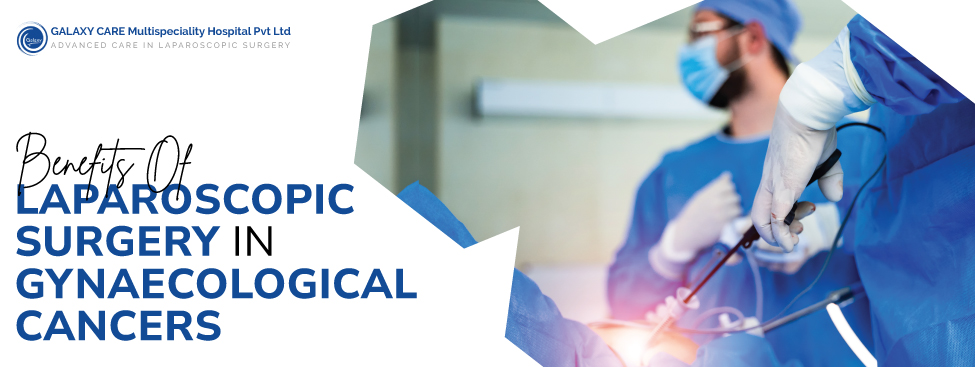
EVERYTHING YOU NEED TO KNOW ABOUT MAMMOGRAPHY
Mammography is a type of breast imaging that uses low-dose X-rays to detect early signs of breast cancer in women. Getting regular mammogram screenings is one of the most effective ways to detect breast cancer early when the chances of successful treatment and survival are highest. At Galaxy Care Hospital, our Breast Cancer Specialists in Pune recommend annual mammography screening for women above 40. In this blog, we will discuss the various aspects of mammogram screening including how it works, benefits, risks, factors to consider and more.
How does a Mammogram Work?
A mammogram is a quick and painless procedure where low-dose x-ray images of the breasts are obtained. During a screening mammogram, the breast is compressed between two plastic plates which spreads out the breast tissue to produce clear images. Two images are typically taken of each breast – one from top to bottom and another from side to side. The entire process takes around 30 minutes. The images are then inspected by a radiologist for any abnormalities such as masses, calcifications or other signs that may indicate breast cancer.
When Should You Get Your First Mammogram?
Most medical organizations including the American Cancer Society recommend that women at average risk of breast cancer should get their first mammogram at age 40. Screening should continue every year thereafter. However, the age to begin screening and frequency should also be discussed with your primary care physician or a breast cancer specialist based on your risk factors and medical history.
Benefits of Regular Mammogram Screenings
Mammograms are proven to reduce the risk of dying from breast cancer. Getting regular screenings allows medical professionals to detect breast cancers early before they are large enough to feel or cause symptoms. According to studies, getting regular mammograms can reduce the risk of dying from breast cancer by 25-30% or more for women aged 40-74. When cancer is found early through a mammogram, treatment options are more effective and have a higher chance of cure. Mammography screening also leads to detecting more non-invasive or localized cancers that have not yet spread, allowing for less aggressive surgical treatments like lumpectomy instead of mastectomy in many cases.
Limitations of Mammograms
No screening or imaging test detects 100% of breast cancers. There is a small chance of false positives requiring additional testing like ultrasounds or biopsies. Mammograms may not detect cancer in women with dense breasts where tumors are harder to distinguish from surrounding tissue. Additional screening methods like breast MRI may be recommended in such cases. It is important to discuss your breast density and family history with your doctor to determine the best screening option for you.
Factors That Increase Breast Cancer Risk
Certain factors increase a woman’s lifetime risk of developing breast cancer. Women with a family history of breast cancer in a parent, sibling or child have nearly twice the average risk and should have annual mammograms starting at an earlier age. Other high-risk factors include a personal history of breast cancer, exposure to radiation therapy to the chest before age 30 and certain genetic mutations like BRCA1/BRCA2. Breast Cancer Specialists in Pune can help determine cancer risks and recommend an optimum screening plan.
Importance of Follow-up and Repeat Screenings
Mammograms may detect abnormalities that require further evaluation with additional tests like ultrasounds or biopsies. Any changes found even if initially thought to be non-cancerous still require close monitoring and repeat mammograms to check for progression or recurrence. Regularly following screening recommendations and promptly addressing any suspicious findings play a vital role both in early detection as well as long-term management of breast health and cancer prevention. At Galaxy Care Hospital, our Best Cancer Specialists in Pune ensure patients receive coordinated, comprehensive and individualized care at each step of cancer screening, diagnosis and treatment.
Conclusion
In summary, regular mammogram screenings remain one of the most reliable ways to detect breast cancer early and improve survival. Combining mammograms with monthly breast self-exams increases awareness of breast changes. Any discoveries should be promptly reported to your doctor. For women at high risk or with dense breasts, additional screening methods may be recommended. Early detection along with coordinated treatment by experts at leading facilities like Galaxy Care Hospital in Pune offers the best chance at successful management and treatment of breast cancer. Let’s make mammography screening a priority to fight this disease. Book your consultation today!


